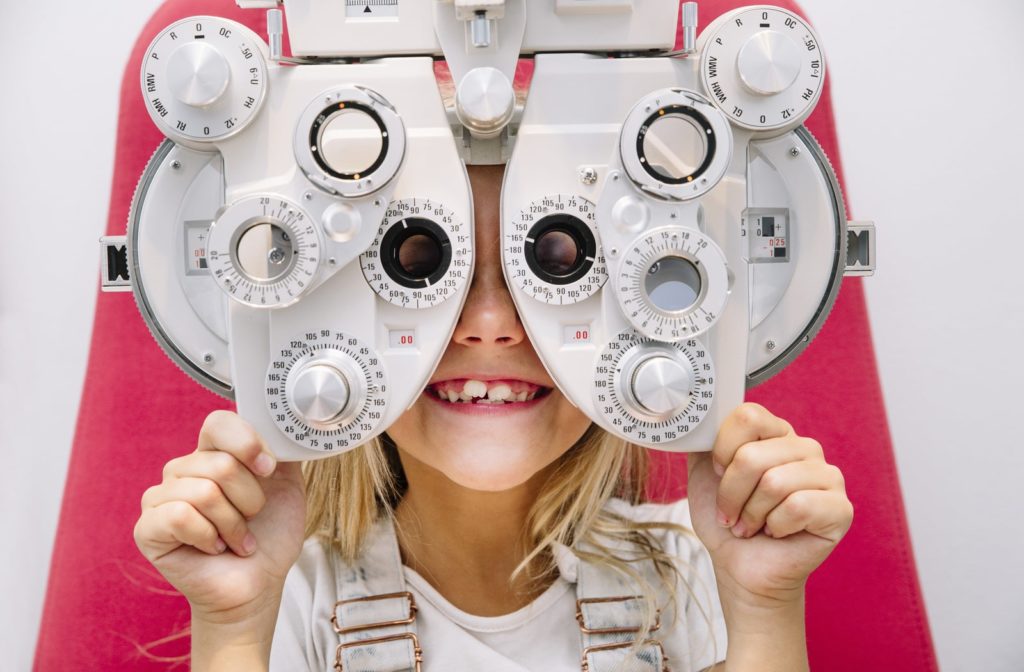Children’s eye exams are essential for assessing and protecting your child’s vision. Your optometrist can identify early signs of eye disease and recommend effective treatments. With how important these eye exams are for children, when should your child have their first?
Continue reading to learn more about children’s eye exams, including when they should have their first exam.
When Should Your Child Have Their First Eye Exam?
Your little one’s first eye exam should occur around 4 to 5 years old.
Their first eye exam helps your eye doctor determine if your child’s vision is developing well and look for any visual concerns. If there are any present issues, your eye doctor may wish to see your child more frequently for eye exams. Make sure you listen to their recommendations and book your child’s eye exams accordingly.
Future Eye Exams
Your child should receive future eye exams as they grow older. Following the recommendations set by the American Optometric Association, your child should have:
- At least one eye exam between 3 & 5 years old
- Annual eye exams from 6 to 18 years old
How Your Child’s Eye Exams Change with Time
Your child’s eyes develop with them as they grow. Because of this growth, your eye doctor will tailor their eye exam for your child’s current stage of development. Your child’s eye exams will become more comprehensive as they age.
Your child’s eye exam will change when they have toddler, preschool, and school-age vision.
Toddlers
Your child is early in their eye development as a toddler, but your optometrist will still assess many parts of their vision. They’ll look for general health concerns and signs of myopia or hyperopia. Additionally, your eye doctor will assess hand-eye coordination, tracking, depth perception, and color vision.
Preschool Children
Ages 2 to 5 are known as preschool age. Your child learns many vital visual skills that help prepare them for school. These skills include hand-eye coordination, fine motor skills, and the perception abilities needed for reading and writing.
You can help your child hone these skills by engaging them with stimulating activities.
Stacking blocks, coloring, playing catch, and drawing are some ways you can help your child develop their visual skills. Your child should receive at least one comprehensive eye exam between ages 3 to 5. Your optometrist can make sure their eyes are developing correctly and look for early signs of eye disease.
School-Age Children
School-age children need annual comprehensive eye exams to evaluate their eye health and vision. Your child needs many visual skills to read and learn, including:
One or more of these skills may have complications, affecting your child’s vision. An undiagnosed vision problem can affect their learning, leading to frustration and stress. Sometimes a vision problem may have similar symptoms as Attention Deficit Hyperactivity Disorder (ADHD), leading to a potential misdiagnosis.
The eye exams your child experiences as they go through school help identify visual problems and track changes in their vision.
The Importance of Children’s Eye Exams
Your child’s vision is essential as they grow and interact with the world. Approximately 80% of learning is visual for children, making their eyesight vital during school. Refractive errors and other vision problems can seem insignificant at first, but they can affect your child’s school performance, self-esteem, and social interactions.
Eye Exams Help Protect Your Child’s Vision & Eye Health
Did you know approximately 20% of preschool children have a vision problem? Eye issues are more common than you think—they can develop in early childhood or be present from birth.
Some conditions like myopia can gradually progress, affecting your child’s vision. Without proper diagnosis and treatment, your child’s vision and eye health may be at risk. Your child’s vision is in good hands with your eye doctor—they can identify problems in their earliest stages and recommend an effective treatment plan.
Your job as a parent is to keep an eye out for signs of an eye problem. Your child may assume everyone sees the world like they do if they have a vision problem. They may not tell you about their struggles.
Schedule an eye exam for your child if you notice any of these symptoms:
- A need to sit close to the television or in front of the whiteboard
- Constant eye rubbing
- Difficulty seeing faraway objects
- Headaches
- Trouble focusing during school or sports
Book Your Child’s Eye Exam Today
Begin caring for your child’s eye health and vision with their first eye exam. Your eye doctor can make sure your child is developing well and address any issues they find.
Contact your optometrist if it’s time for your little one’s first eye exam and get them started on their eye care journey.




